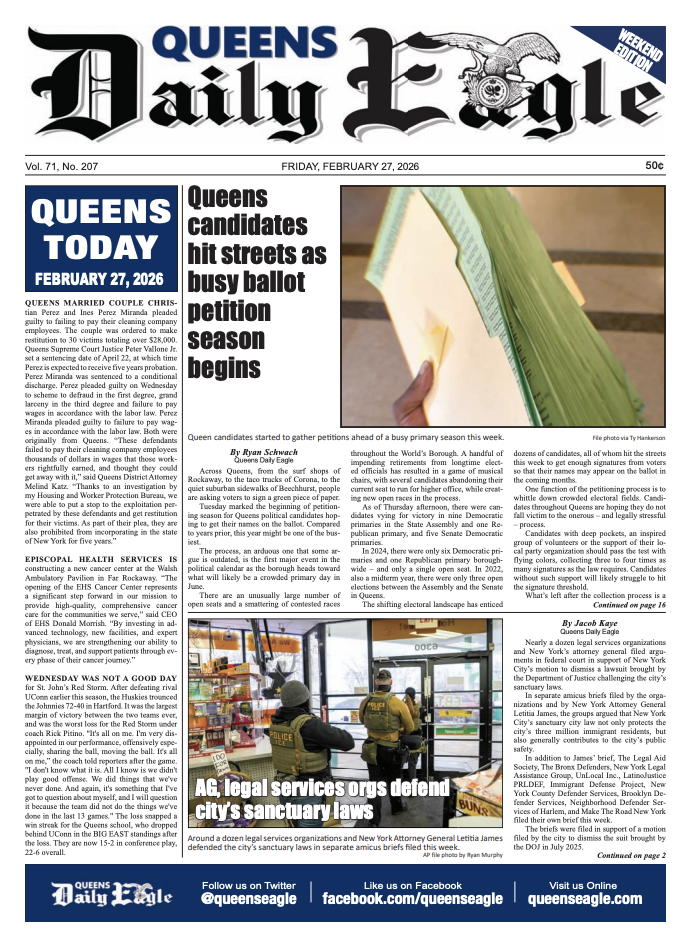Attorneys celebrate judge influx in Family Court
/Queens attorneys say the influx of judges in Family Court will go a long way toward reducing the backlog of cases. Photo by Jim Henderson/Wikimedia Commons
By Jacob Kaye
Queens Family Court has recently seen an influx of judges assigned to the court to reduce the massive backlog of cases stemming from the pandemic.
In addition to a handful of judicial appointments to the court by Mayor Bill de Blasio, several Queens Supreme Court Justices were recently recertified, brought back to the bench and assigned to Family Court in an effort to get cases moving.
Attorneys who practice in Queens say the actions taken to sift through the thousands of backlogged cases are welcomed, needed and extremely important for struggling families in the borough.
“You should be able to be in front of a judge in a relatively short amount of time to have a hearing to say whether you're entitled to see your child or whether there are grounds to withhold the child from you,” said Rachel J. B. Weisman of Weisman Law Group. “I think having more judges is definitely a great step...it's going to help parents in the court system move these cases along.”
With the courts closed to non-emergency cases throughout most of the pandemic, child support disputes, visitation right conflicts and other similar issues went mostly unheard, leaving some parents without recourse.
“In an instance where a mother is not getting child support, that really impacts a family significantly, if they lack resources,” said Frank Bruno, a Queens attorney and president of the Queens County Bar Association. “They need judicial intervention.”
There are currently around 62,290 dockets pending citywide in the New York City Family Court across all specialties, according to an Office of Court Administration spokesperson. If 100 cases are heard per day, it would take around 2 and a half years to clear the backlog.
The consequence of the pandemic shut down has seeped into the pandemic recovery, with the backlog preventing new cases from being heard.
“The implications of having a backlog is that you have so many families out there who have disputes, and they're trying to get a resolution but due to the backlog resulting from COVID they're having to wait extended periods of time to see a resolution,” said Lesley Lanoix, an attorney based in Jamaica.
But as some families wait to have their cases heard, some have had to solve disputes on their own, which in some cases isn’t necessarily a bad thing, Lanoix said.
“On a few cases, the upside [of the backlog] is that some have been able to resolve issues on their own without the assistance of the court,” he said. “COVID has brought a lot of families together or helped them to see things in a different light in terms of disputes that they have.”
With the courts slowly reopening to the public, the Office of Court Administration brought back Queens Supreme Court Justices Ira Margulis, Joseph Espostio and Bernice Siegal to hear cases in Family Court. After a two-day training on the part, the judges are back on the bench and hearing cases.
Additionally, Mayor Bill de Blasio announced the appointment and reappointment of Judges Tamara Walker, Cynthia Lopez, M. Liberty Aldrich, Alan Beckoff and Anne-Marie Jolly. All have been assigned to Family Court in the city.
“For their entire careers, these judges have championed dignity and fairness,” de Blasio said earlier this week.
For some of the returning and new judges, Family Court will be new, but attorneys aren’t worried that their lack of expertise in that specific court will have any effect on the application of justice.
“They're highly intelligent and intellectuals that can learn and if they don't know the answer, they can find the answer,” Weisman said. “Ultimately, I do think that having more judges, even if they don't know it right now, I think in a few months on the bench, they will be well versed in the law. You learn a lot when you're sitting on the bench.”
While the influx of judges will go a long way toward reducing the number of cases waiting to be heard, there are also other ways to get the backlog down, attorneys say.
“I don't think [bringing in more judges is] the sole remedy, but I think it's definitely a good start,” Lanoix said. “There’s a mediation program that’s opened up again where families who have disputes...are invited to go ahead and go through mediation to resolve them. That’s definitely a tool to implement in terms of trying to alleviate the backlog within Family Court.”
But in the end, attorneys believe the incoming judges are going to go a long way toward helping families in need of judicial remedies.
“They'll be a great thing for the family courts,” Weisman said. “They’ll get the cases moving again and more quickly.”




